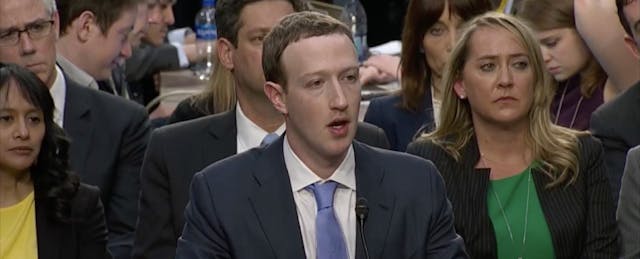Today Mark Zuckerberg, Facebook’s founder and CEO, spent over four hours testifying in front of the Senate. The leader of the social media giant, with over 2 billion active users, answered questions about data ownership and usage in light of the fallout over Cambridge Analytica’s access and use of 87 million Facebook users’ personal information.
As the senators interrogated the Facebook chief about a range of data practices and protocols, several questions pertaining to the company’s approach toward younger users emerged. These are issues that educators are watching closely as the use of social networking tools in schools have expanded in universities and K-12 schools over the years. In New York City alone, over 1,387 school buildings allow “social networking” platforms including Facebook, according to information provided to EdSurge by the city department of education.
Messenger Kids
Facebook has come under fire for a messenger app it released for kids younger than age 13 (who cannot make Facebook profiles). In January, over 100 child health experts asked Zuckerberg to shut it down. In February, Wired uncovered that Facebook paid many of the experts it said it consulted with to make the app safe for younger users.
Senator Dick Durbin (D-Ill.) brought up concerns that health experts have warned Zuckerberg about, and asked him what guarantees he could give that no data from Messenger Kids “is or will be collected or shared with those that might violate the law.”
Zuckerberg said the app collects a “minimum amount” of information that is needed to operate the service, such as the messages people send, but that “in general” the data won’t be shared with third parties and is not connected to the “broader Facebook experience.”
Durbin, a former lawyer, pressed Zuckerberg to clarify the “in general” part of his response, and whether there are any exceptions that would allow data to be shared with third parties.
Zuckerberg refuted: “No, it will not” be shared in any circumstance.
Durbin then asked if Zuckerberg is open to the idea of allowing an adult who used Messenger Kids as a child to go back and delete his or her data. He replied that a Messenger Kids account doesn’t automatically roll over to a Facebook account, and that “it’s a good idea to consider making sure that all that information is deleted and in general, people are going to be starting over when they get their Facebook or other accounts.”
Privacy For Kids Where COPPA Doesn’t Apply
The Children’s Online Privacy Protection Act, a law passed in 1998 to protect the online activities of children under age 13, requires young to have special permissions from adult guardians before engaging with certain websites. Lawmakers have been toying with the idea of expanding those regulations to cover teenagers up to 16 years old.
The proposal’s author, Senator Ed Markey (D-Mass.), asked Zuckerberg directly whether he would support a new “privacy bill of rights for kids,” under which Facebook would have to get permission from the parents before any of their information is used for purposes other than the original intent.
“I’m not sure,” he stammered, noting his uncertainty and a need to see the details within the proposed legislation. But he acknowledged it’s “certainly a thing that deserves a lot of discussion.”
“We’re leaving these children to the most rapacious commercial predators in the country,” Markey stated.
Tech Addiction
On the heels of privacy discussions was general tech addiction. Former Facebook insiders themselves have spoken out. Former Facebook president Sean Parker said in November that the site’s founders knew they were exploiting “a vulnerability in human psychology.” And in February, early employees of Google and Facebook decried the platform, one former Google design ethicist, Tristan Harris, said educators using Facebook were “racing to the bottom.”
Senator Ben Sasse (R-Neb.) wanted to know if, as a father, Zuckerberg worries about social media addiction among American teenagers.
Zuckerberg said Facebook’s responsibility is not just building services that people like, but building ones that “are good for people and good for society as well.”
“If you’re using social media to build relationships," he added, “then that is associated with all the long-term measures of well-being. But if you’re using the internet and social media to passively consume content and not engaging with people, then it doesn’t have all the positive effect and is negative.”
Zuckerberg didn’t name any particular studies but could have been referencing this blog post on the Facebook site, which mentions some research looking at the good and bad of social media. The post links to a 2017 study finding that “overall, Facebook use does not promote well-being” and “individual social media users might do well to curtail their use of social media and focus instead on real-world relationships.”
Basse also asked whether Facebook hired consulting firms that specialize in “dopamine feedback loops” to keep its users on the platform. Zuckerberg says the company does not.
Third-Party Edtech Apps on Facebook

Do education apps such as Quizlet that allow users to create accounts via Facebook also collect data on users? How much data is collected, where is the data stored, and who can access it?
It’s hard to say as the Facebook CEO consistently gave obscure answers such questions from lawmakers. Zuckerberg only noted that the company clamped down on the amount of data collected by app developers in 2014. It is currently investigating which developers were able to access large amounts of user information before that restriction was in place, and what they did with that data.
“We believe that we’re going to be investigating many apps—tens of thousands of apps. And, if we find any suspicious activity, we’re going to conduct a full audit of those apps to understand how they’re using their data and if they’re doing anything improper,” Zuckerberg told Senator Chuck Grassley (R-Iowa). “If we find that they’re doing anything improper, we’ll ban them from Facebook, and we will tell everyone affected.”


